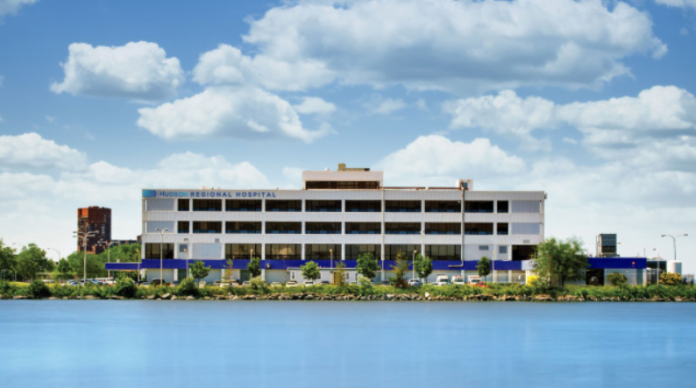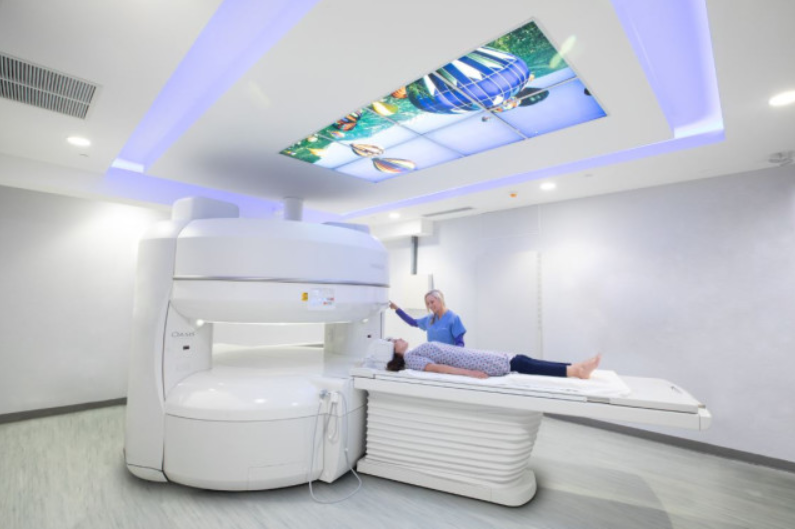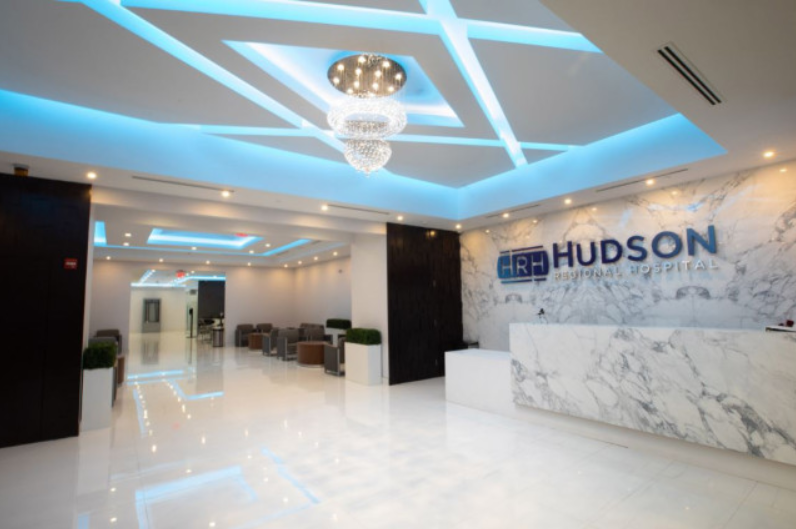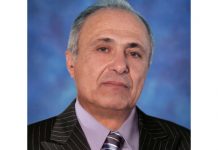
As mergers, acquisitions and consolidations continue to roil the American health care system, it’s not uncommon for decisions about community hospitals to be made by business executives and medical leaders in a different state or time zone.
 Hudson Regional Hospital is an exception to that rule (and many others). At the independently owned Secaucus hospital, the distance between owner and patient, between the president/CEO and his fellow physicians, can be measured in footsteps, not miles.
Hudson Regional Hospital is an exception to that rule (and many others). At the independently owned Secaucus hospital, the distance between owner and patient, between the president/CEO and his fellow physicians, can be measured in footsteps, not miles.
“Health care, more than any other profession, field or endeavor, is about human interaction,” says Yan Moshe, chairman of the board at Hudson Regional Hospital. “Whether it’s a physician taking a history, a nurse providing postoperative care or a physical therapist guiding a patient through rehabilitation exercises, health care ‘happens’ one-on-one, and the competence, communication skills and compassion that the health care professional brings to that interaction determine the quality of care and the outcomes achieved. I believe the same is true of those who lead hospitals. To lead effectively, we need to be in close touch with our patients and their families, our physicians and nurses, and the entire staff.”

Moshe speaks from experience — and practices what he preaches. His January 2018 purchase of the hospital is the high point to date in a 22-year health care career that includes owning and managing surgical and imaging centers and playing a leadership role in other medical enterprises. His main office is located within the hospital, so Moshe is in regular contact with Hudson Regional Hospital’s patients, visitors, physicians and staff. Similarly, President and CEO Nizar Kifaieh, MD, MBA, CPE, FACEP, is a familiar presence throughout the hospital, making daily rounds to monitor everything from patients’ care and employees’ morale to the status of several expansion and renovation projects.
“When we took over, one of our top priorities was strengthening relationships with all of the constituencies critical to successfully operating a hospital. Patients, their families and the community are at the heart of that effort, of course, but our outreach also extended to physicians already on staff, physicians who we wanted to join our staff, the nurses and other members of the health care team, and insurers and managed care plans,” Moshe says.
As Moshe and his leadership team approach the two-year mark of their taking the helm at Hudson Regional Hospital, the results of that effort are evident on many fronts:
- More than 400 physicians have joined the hospital’s staff.
- Long-standing issues with the union representing the hospital’s nurses have been resolved, and employees have received raises.
- The hospital has greatly expanded its participation in insurance and managed care plans, and now has “in-network” status with virtually all the major plans serving area residents.
- Outreach to local civic and elected leaders, school systems, faith-based groups and nonprofit organizations has woven Hudson Regional Hospital more firmly into the fabric of the community.
- Leaders have worked closely with regulators to meet — and often exceed — requirements put in place when the state government approved the sale of the hospital.
- Utilization of the hospital and its services has increased dramatically.
That stakeholder-focused campaign unfolded in parallel with an ambitious capital-improvement program that has seen the Radiology Department and hospital lobby renovated, upgrades to patient rooms and acquisition of robotic surgery platforms and other cutting-edge technologies, with further enhancements under way or planned for the years ahead.
Moshe and his team took over the hospital at a point when the institution was in critical condition, and when many in the state’s health care industry doubted whether it could survive. The hospital was caring for 30 or fewer inpatients each day, experiencing significant financial problems, and under scrutiny from regulators regarding its financial-reporting practices.
Twenty-two months — and over $40 million in investment — later, both inpatient and outpatient volume have grown dramatically, as new physicians, new services, greater insurance plan participation, and upgraded and expanded clinical facilities have brought people from throughout the region — and from across the country (more on that in a moment) — to Hudson Regional Hospital for care.
“Obstetric admissions are up 300%, overall inpatient admissions are significantly higher, Emergency Department visits have increased, and surgical volume has grown exponentially,” notes Kifaieh. He explains that the hospital’s expanded ranks of orthopedists and neurosurgeons are performing more than 140 spinal procedures each month.
“We can be much nimbler and more responsive than a large organization. We operate here in the community, and so are intimately familiar with the community’s needs. Once we identify a need, the decision-making process on how to respond is streamlined, and our lean management structure allows us to act quickly and in a cost-efficient manner.”
— Yan Moshe, Chairman of the Board, Hudson Regional Hospital
The successes Hudson Regional Hospital have enjoyed result from identifying opportunities, developing a strategy to realize those opportunities and making the commitment necessary to implement the strategy effectively, Moshe says.
“The location of the hospital was what attracted my interest initially,” explains Moshe, who notes that the institution’s proximity to the Garden State Parkway and New Jersey Turnpike; routes 3, 1 and 9; the Lincoln Tunnel; and Newark Liberty International Airport make it ideally situated to serve both residents of nearby communities and those coming from New York City or even farther away. “As I dug deeper, I also became convinced that our team’s health care acumen would enable us to enact management approaches that could return the hospital to financial health — as we have — while offering the highest quality of care,” he adds.

A Two-Pronged Strategy
Moshe’s prescription for Hudson Regional Hospital entailed doubling down on its commitment to the community while developing highly specialized surgical services to attract patients from across the region and even nationwide.
“We are enhancing the services that are central to being a full-service community hospital — including emergency care, obstetrics, pediatrics and primary care. We have added physicians and forged close relationships with group practices — such as Riverside Medical Group — to provide readily accessible, high quality care to area residents in a comfortable, convenient and compassionate setting. At the same time, we are determined to be a ‘destination surgical center’ for people from near and far who need the next-generation orthopedic procedures and other types of minimally invasive surgery,” the hospital owner says.
Toward that end, Hudson Regional Hospital has launched its Institute for Robotic Surgery, where orthopedic, spine, neurologic, gynecologic, bariatric and general surgeons are employing Mazor Robotics and the da Vinci Xi Robotic Surgical System to bring greater precision and operative safety to the procedures they perform. The institute also features the ExcelsiusGPS Robotic Navigation platform, the first technology to combine a rigid robotic arm and full navigation capabilities for precise trajectory alignment in spine surgery. “These technologies offer significant advantages to patients undergoing procedures to treat disc herniation, degenerative disc disease, scoliosis and other spinal conditions, as well as pelvic-reconstruction procedures, hysterectomy, hernia repair, prostate cancer surgery and more,” Kifaieh says.
Meanwhile, other investments are focused on better serving the needs of area residents. The hospital is acquiring technology to enhance its care of patients experiencing urgent or emergent cardiac conditions, is establishing a Wound Care Department and an Epilepsy Center and will provide services to patients dealing with dual diagnoses of psychiatric conditions and drug or alcohol dependency.
Kifaieh notes that those service enhancements and related physical renovations are possible because of Moshe’s commitment to the hospital’s success. “When state regulators approved the sale of the hospital in 2018, they required that an additional $3 million be invested in Hudson Regional Hospital over five years. Mr. Moshe already has made or committed to $40 million in investments. That 10-fold-plus difference in what was required and what we’re actually doing is a good measure of how invested — literally — Yan is in ensuring that Hudson Regional Hospital provides the highest quality of care,” he says.

The Advantages of ‘Going It Alone’
The course Moshe, Kifaieh and their team have charted for Hudson Regional Hospital bucks key trends that have shaped American health care in recent years. They are expanding services just as many community hospitals are cutting back. Further, they have chosen to operate Hudson Regional Hospital as an independent, privately owned hospital at a time when a wave of consolidation is seeing hospitals gobbled up by large, multistate organizations.
Moshe is not troubled by the prospect of being a “David surrounded by Goliaths.” In fact, he says that Hudson Regional Hospital’s independent status offers considerable benefits to both the institution and the patients it serves.
“We can be much nimbler and more responsive than a large organization. We operate here in the community, and so are intimately familiar with the community’s needs. Once we identify a need, the decision-making process on how to respond is streamlined, and our lean management structure allows us to act quickly and in a cost-efficient manner,” Moshe says.
Kifaieh adds that Hudson Regional Hospital’s stand-alone status confers clinical as well as operational advantages. “Evidence indicates that quality of care can suffer as health care systems increase in size,” says the physician, an emergency medicine specialist by training and practice. He adds that the hospital now is participating in quality-assessment programs run by independent, nationwide nonprofit organizations.
“We’re proud of what we’ve been able to accomplish within our first two years of owning and operating Hudson Regional Hospital, but even better things await in the next two years,” Moshe says.
*******
Hudson Regional Hospital is located at 55 Meadowlands Parkway in Secaucus, and is easily accessible from routes, 1, 3, 9 and 17; I-495; the New Jersey Turnpike and Garden State Parkway; and the Lincoln Tunnel. To learn more about the hospital’s robotic-assisted surgery program and other services, visit hudsonregionalhospital.com.
credit to nj.com










